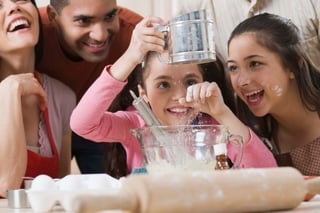Home Safety Tips for Holiday Cooking
[fa icon="calendar"] December 17, 2020 / by Home Services Expert
 Everything in the kitchen seems to multiply over the holidays: the number of meals and desserts we prepare, the number of kitchen tools that get pressed into action and the number of people who hover close by.
Everything in the kitchen seems to multiply over the holidays: the number of meals and desserts we prepare, the number of kitchen tools that get pressed into action and the number of people who hover close by.
Unfortunately, the number of accidents multiply, too, making the holidays the riskiest time of the year to be in the kitchen. Fires peak around the holidays, followed by injuries caused by knives, cookware, food processors, microwaves and blenders.
Unless you decide to order take-out, you probably won't be able to make your kitchen a completely “risk-free zone.” But you can greatly reduce the risks by following safety tips from the National Fire Protection Association, the Consumer Product Safety Commission and Consumer Reports, brought to you by the people who have a vested interest in your safety year-round: Experts in Your Home.
Home Safety Tips for Holiday Cooking:
Practice Fire Safety
Leaving food that is cooking on the stove unattended triggers more than one-third of all kitchen fires, and half are fueled by grease, oil or fat. Play it safe by:
- Never leaving food unattended. Turn off the heat – and the rationalization that you'll be gone “only” a short time by reminding yourself that the food you're cooking won't have time to get cold in “only” that limited amount of time.
- Keep flammable objects – towels, pot holders, paper towels – away from the stovetop.
- Turn pot and pan handles inward on the stove.
- Use the back burners whenever possible. They may be less convenient for you, but they're much more difficult for children to reach.
- Keep a fire extinguisher nearby. If you don't have one, be prepared to douse a grease fire with baking soda.
- Do not use extension cords in the kitchen. Overloaded or frayed cords can trigger fires.
Practice Knife Safety
Dull knives can be more hazardous than sharp ones because people often exert more pressure on them. Knowing this:
- Keep knives sharpened and in peak condition.
- Make cuts away from your body, on an angle.
- Ensure that your cutting board won't slide on the counter. Place a damp towel underneath it if it is.
Practice Cookware Safety
By all appearances, glass and ceramic cookware looks sturdy. But it can shatter easily, so:
- Discard cookware that is compromised by chips or cracks.
- Don't move cookware straight from the oven to the freezer – or the other way around. Let the cookware cool down first.
- Place hot food on trivets, cork heating pads or hot pads rather than on a cold or damp surface.
- Never place cookware on top of a burner or under a broiler.
Practice Food Processor Safety
As you might guess, blades are the biggest cause of injuries caused by food processors of all sizes. Keep your fingers safe by:
- Placing the processor on a flat and stable surface.
- Using a spatula, not your fingers, to press food inside the bowl as well as to remove it.
- Ensuring that the bowl is properly locked onto the base and the lid is closed before turning it on.
- Turning off a processor and unplugging it before dislodging it from the base.
Practice Microwave Safety
Prevent burns by:
- Letting food cool off for at least 1 minute before removing it.
- Using pot holders to protect your hands as you remove food.
- Removing plastic wrap slowly and carefully; even steam can cause burns.
- Abstaining from boiling water in the microwave. Even calm water can deceive you by erupting violently.
Practice Blender Safety
Like food processors, the blades on blenders are the riskiest component. And injuries from immersion blenders are growing, perhaps because cooks underestimate their power or because many immersion blenders are not equipped with safety interlocks. Either way, protect your hands by following the same tips that pertain to food processors.
Our Team is Here to Help Ensure Your Home Safety
Above are things you can do to stay safer. If you end up with any home safety concerns that you don't feel qualified to address, such as fire hazards, electrical, plumbing, or structural issues please give us a call and let our home experts help you.



